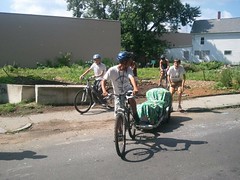It was few years back when I actually heard racism defined as a social construct. It was at this time that I was introduced to the idea that “race” did not really exist, but was used as a tool in systematic oppression. While I have spent some time examining this concept and how it elevates and oppresses, it wasn’t until I went to Ghana last summer that I could actually experience what it felt like to sit in a room or ride public transportation and simply be a “person” instead of “the black person” with all the assumptions attached to what that means. In Ghana, for someone to determine my “value” or “status” they could not simply look at the color of my skin. It was almost ass if I had left my “race” behind.
Here in the U.S. I am always conscious of how my race is viewed in whatever situation that I am in. I know that in some circles I am to be pitied as the victim of oppression, in others the most likely perpetrator of underachievement, and still in others the minority with the assumed minor role in group. In most cases I am the living breathing representation of unchallenged assumptions of an entire race. My deviance from those assumptions only serves as evidence of some minor exception but only within the context of what is considered peculiar for “those people.”
Allan Johnson notes, that “reducing people to a single dimension of who they are separates and excludes them, marks them as ‘other,’ as different from ‘normal’ people and therefore as inferior…”(15)
Internalized and interpersonal oppression is perpetuated by institutional oppression that creates unjust systems and assigns power and privilege to the dominant group. While examining these paradigms are vital, these concepts are often somewhat large and complex to convey to youth.
GtC’s approach is direct education through engagement with a more observable system: Food. Because food deals with our health, lifestyle, culture and community we can more readily identify and examine inequities and systematic dis-empowerment that are part of a larger social system.
For GtC focusing on food systems is a relevant and productive way in which we have decided works as a segway into issues of oppression, inequality and racial healing. By focsuing on something as fundamental as eating and where our food comes from, we are able to look at the broader context of community and empowerment.
Allan G. Johnson, The Social Construction of Difference, Readings for Diversity and Social Justice, Maurianne Adams et al, Routledge Taylor Francis Group, New York London, 2010






